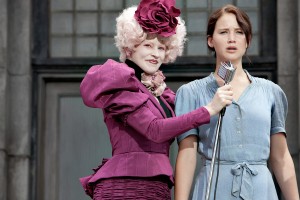The Hunger Games questions morality
The Hunger Games deals with twisted subjects, such as survival of the fittest, rarely discussed in mainstream media.
It involves children being forced to brutally kill one another and details a violent world run by a ruthless government yet the film has somehow swept the nation in a craze of fandom.

Survival of the fittest · Elizabeth Banks (left) and Jennifer Lawrence (right) star in Gary Ross’ The Hunger Games, a film that critiques society as it calls a cruel and oppressive government into question. - Photo courtesy of Lionsgate
Beneath the violence and inhumanity of the film’s premise, though, lies the story of a heroine whose perseverance, resilience, compassion and self-discovery yield the rare capability to expose truth and catalyze meaningful action in anyone who sees the film.
Brilliantly directed by Gary Ross, The Hunger Games is set in the post-apocalyptic dystopian nation of Panem, comprised of 12 Districts under the cruel governing body known as the Capitol — the governing body that imposes an annual nationally televised event known as The Hunger Games in which one boy and one girl from each district must fight to the death, and only one can win.
Katniss Everdeen (Jennifer Lawrence), a 16-year-old girl who lives in the poor and starving District 12, volunteers as a tribute in the Games in place of her younger sister Primrose. Katniss, along with Peeta (Josh Hutcherson), the male tribute selected from District 12, are whisked off to the Capitol where they undergo training and mentorship from the drunken former Games champion Haymitch Abernathy (Woody Harrelson) to prepare them for the immeasurable challenges of the games and help them win public favor.
But the Games are first and foremost a form of entertainment, so when Katniss and Peeta develop a friendship and hint at something more, the game-makers are quick to manipulate the rules to capitalize on this budding romance, further compromising and complicating the lives of the tributes and forcing Katniss to question everything she ever knew about sacrifice, survival, humanity and the world she is expected to accept.
From start to finish, The Hunger Games is mesmerizing.
The world of Panem is so estranged from our modern world, yet so many haunting aspects to that world parallel ours in a way that invites the viewer to truly analyze society in an unexpected, unprecedented way.
The parallel of the nationally televised Hunger Games with the prevalence of reality television in our society spotlights the frightening concept of taking pleasure in and celebrating the misfortune and pain of others — a notion that is rarely addressed in the modern media.
For those familiar with The Hunger Games trilogy, the film adheres faithfully to the books, leaving out a few minor details and not sacrificing any of the heart and integrity of the series.
Furthermore, the film adds a welcome dimension to the story that is not present in the book by intermittently cutting to the action at the Capitol and in the districts rather than remaining in Katniss’ viewpoint during the Games, which only enhances the story by displaying the implications of the Games throughout the nation rather than confining them to Katniss’ imagination.
And though The Hunger Games adheres to the series, certain aspects of the film might elude the grasp of those who are not familiar with the books.
The entire cast’s acting is superb, although Lawrence undoubtedly steals the show as heroine Katniss.
Lawrence, a lesser-known actress whose credentials include mostly independent films, commands the role of Katniss with mastery. She is able to impeccably marry the strength and confidence of the heroic Katniss with the humility and graciousness that are also paramount to her character.
It is all too common in this day and age that female characters intended to be heroines amount to nothing more than weak “damsel in distress” archetypes — for example, Twilight’s Bella Swan — usually balking at the first indication of trouble and caring about nothing more than falling in love.
Katniss Everdeen embodies everything the weak female stereotype lacks — strength, independence, self-confidence and courage — without losing an ounce of her femininity and appeal as she steals the hearts of Gale (Liam Hemsworth) and Peeta, as well as the affections of Panem.
One of USC’s own, sophomore film and theatre major Alexander Ludwig, makes an appearance in the film as Cato, the most fearsome of the tributes who has been preparing to compete in the Games his entire life.
For most of the Games, Cato appears impenetrable and unfazed — able and willing to kill anything and anyone who crosses his path.
Yet it is vital that the audience recognizes Cato is still human. Ludwig brings that humanity to the role through subtle yet immeasurably powerful moments, lending insight into the implications of this cruel government on the soul and humanity of these young people.
Hutcherson perfectly embodies the role of Peeta, capturing his charm, innocence, gentleness and courage that make it impossible not to adore and root for him alongside Katniss.
Through and through, The Hunger Games succeeds with flying colors.
The life-changing journey taken by every character in the film involving the juxtaposition of their humanity with the innate need to survive seeps into the viewer’s experience, making the impact of the film extend far beyond the two and a half hours it takes to watch.

Was the same premise the Tagline in the Schwarzeneggar Movie “Running Man” (1987)? Been there, Done that.
I guess “Everything Old is New Again”.